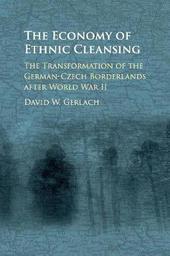
|
The Economy of Ethnic Cleansing: The Transformation of the German-Czech Borderlands after World War II
Paperback / softback
Main Details
| Title |
The Economy of Ethnic Cleansing: The Transformation of the German-Czech Borderlands after World War II
|
| Authors and Contributors |
By (author) David Wester Gerlach
|
| Physical Properties |
| Format:Paperback / softback | | Pages:309 | | Dimensions(mm): Height 230,Width 153 |
|
| Category/Genre | Genocide and ethnic cleansing
Second world war |
|---|
| ISBN/Barcode |
9781316647196
|
| Classifications | Dewey:943.71042 |
|---|
| Audience | | Professional & Vocational | |
|---|
| Illustrations |
Worked examples or Exercises; 3 Maps; 7 Halftones, black and white
|
|
Publishing Details |
| Publisher |
Cambridge University Press
|
| Imprint |
Cambridge University Press
|
| Publication Date |
28 March 2019 |
| Publication Country |
United Kingdom
|
Description
In the wake of World War II the Sudetenland became the scene of ethnic cleansing, witnessing not only the expulsion of nearly three million German speakers, but also the influx of nearly two million resettlers. Yet mob violence and nationalist hatred were not the driving forces of ethnic cleansing; instead, greed, the search for power and property, and the general dislocation of post-war Central and Eastern Europe facilitated these expulsions and the transformation of the German-Czech borderlands. These overlapping migrations produced conflict among Czechs, hardship for Germans, and facilitated the Communist Party's rise to power. Drawing on a wide range of materials from local and central archives, as well as expellee accounts, David Gerlach demonstrates how the lure of property and social mobility, as well as economic necessities, shaped the course and consequences of ethnic cleansing.
Author Biography
David Wester Gerlach is Associate Professor at Saint Peter's University, New Jersey. His current research explores restitution, reparation, and other compensation programs stemming from World War II, alongside the study of forced migration. He was awarded a Richard M. Hunt Fellowship for the Study of German Politics, Society, and Culture by the American Council on Germany in 2017, the R. John Rath Prize for Best Article in the 2007 Austrian History Yearbook, and the 2006-7 Best Dissertation by the Austrian Cultural Forum.
Reviews'The Economy of Ethnic Cleansing is timely and essential reading for anyone who wants to understand the dynamics of forced migration in the modern world. Economic considerations shaped every aspect of the creation of a nationally-homogenous Czechoslovakia at the end of the Second World War. The need for labor determined who would stay and who would go; Czechs raced to claim German homes, businesses, and property; and the expulsions formed a key part of the transition to a Socialist economy. This deeply researched and highly original work will change the way we understand the violent aftermath of the Second World War.' Tara Zahra, author of The Great Departure: Mass Migration from Eastern Europe and the Making of the Free World 'The Economy of Ethnic Cleansing stands out among histories of postwar forced migration in Europe thanks to its compelling, fine-grain narrative of how ethnic cleansing develops at the ground level. Through a series of gripping vignettes, Gerlach unravels both traditional and revisionary accounts of the expulsion of the Sudeten Germans and, in their place, demonstrates how competing actors with conflicting economic interests determined when, how, and to what extent the human and physical geography of the Czech borderlands was transformed in the postwar years. The book is an impressive accomplishment that should be on the reading list of anyone interested in the study of ethnic cleansing.' Benjamin Frommer, author of National Cleansing: Retribution against Nazi Collaborators in Postwar Czechoslovakia 'A terrific study - carefully researched, thoughtfully argued, and highly readable. Through its innovative focus on the economics of ethnic cleansing this book adds significantly to our understanding of underlying motives, the process of expulsion and resettlement, and the long-term consequences. An important contribution to the historiography of ethnic cleansing.' Gregor Thum, author of Uprooted. How Breslau Became Wroclaw During the Century of Expulsions '... provides an extremely well-researched guide to the ethnic cleansing of Sudeten Germans after WWII. Highly recommended.' B. Lieberman, Choice 'This book should be essential reading for all students of the region as well as those studying ethnic cleansing and population transfers.' Cathie Carmichael, H-Net 'David Gerlach's study of the borderland between 1945 and the mid-1950s draws compelling connections among expulsion, settlement, expropriation, the Communist coup d'etat in 1948, and lasting changes to the economy.' Jeremy King, The Journal of Modern History 'Gerlach's thoughtful, well-researched study of the plight of ethnic Germans in the postwar Czech borderlands is a welcome addition to the literature about an often misunderstood or forgotten episode in the complex history of postwar Central and Eastern Europe.' David M. Crowe, Journal of Interdisciplinary History
|